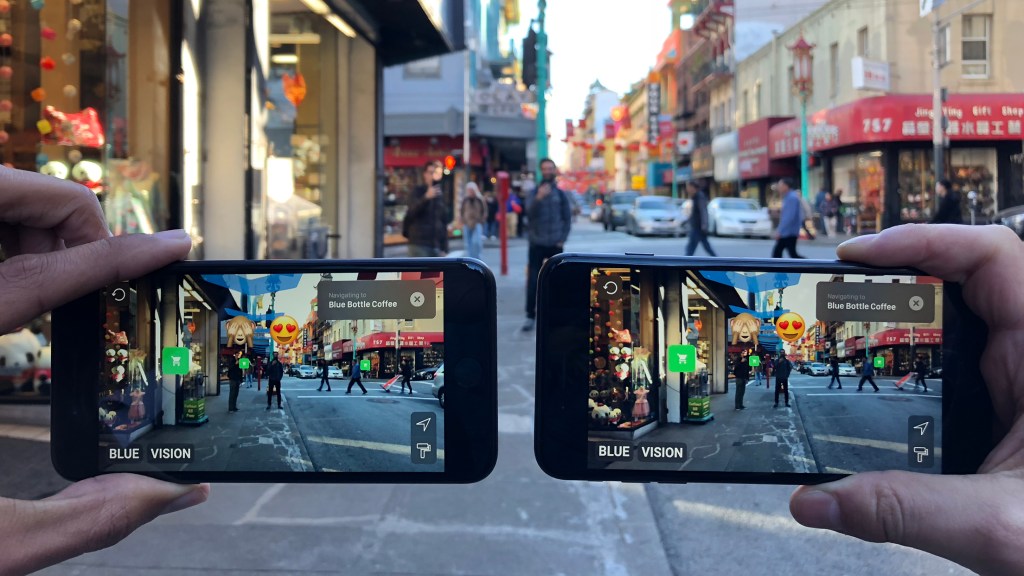Blue Vision Labs, a London-based augmented reality startup co-founded by computer vision experts from Oxford and Imperial College, is emerging from stealth today with a new platform that it claims will be the first to bring ‘collaboration’ to the AR experience. With an app built on Blue Vision’s technology (via its API and SDK), multiple users will be able to see the same virtual objects, and interact with each other in that virtual space with spatial accuracy that hasn’t been seen in widely-available AR services before.
Scenarios where this kind of feature could come in useful could include multi-player games, on-street navigation apps, social media applications and education.
Peter Ondruska, the startup’s co-founder and CEO, tells me that Blue Vision’s tech can pinpoint people and other moving objects in a space to within centimeters of their actual location — far more accurate than typical GPS — meaning that it could give better results in apps that require two parties to find each other, such as in a ride-hailing app. (Hands up if you and your Uber driver have ever lost each other before you’ve even stepped foot in the vehicle.)
Blue Vision has been in stealth mode for the past two years building its product — and its founding team, which also includes Lukas Platinsky, Hugo Grimmett, and repeat entrepreneurs Andrej Pancik and Bryan Baum, have been working on the idea since 2011 — but now it is finally hitting the ground running.
Along with the launch of its SDK for developers, Blue Vision is announcing that it has raised $17 million in funding — $14.5 million in a new Series A led by Alphabet’s GV, plus another $2.5 million in Seed funding that it raised earlier from Accel, Horizons Ventures, SV Angel and others — all of whom also participated in this latest round, too.
The SDK will initially be free to use, Ondruska said.
There’s been a surge of interest in augmented and virtual reality technology in the last couple of years, fuelled by some interesting moves from larger tech companies like Google and Apple — launching developer kits to build applications, and working on more hardware to consume it — investments by larger media companies in building content for these platforms, and hundreds of millions of dollars that investors are pouring into the army of startups that are building both software and hardware to usher in this new age of how we will, apparently, all soon be seeing the world.
Some of these investments have so far felt like audacious moonshots. Magic Leap’s mountain of funding, for example, has yet to materialise into anything we can use, virtually or otherwise. But some are making their way to people today, and definitely causing a stir, if not a massive wave of usage. Think here of Apple’s ARKit and Google’s ARCore.
And VR development has even already started to tackle the collaboration challenge, too: recall Facebook’s Oculus division’s work on Rooms, where you can interact with multiple people.
Blue Vision’s approach is a little different from Oculus, in that it requires no more hardware than what many people already have — a smartphone and a basic smartphone camera — both to interact with the experience and to ingest the environment to build that experience. The fact that Blue Vision provides a relatively low barrier to entry, while also doing an enormous (and ground-breaking) amount of heavy lifting at the back end to solve a persistent challenge in AR, is what potentially makes the startup unique and noteworthy.
“They have reduced the need for specific, tailored hardware,” said GV’s Tom Hulme, who is joining the board. “Where we might have needed multiple lenses before, they have achieved same thing with a basic smartphone lens.”
Some of that heavy lifting has also involved building highly detailed maps that developers can now use to build collaborative AR experiences: the idea here is that the map of a space becomes the canvas onto which all of the other objects get placed for their interactions.
Ondruska said that initially the company has built maps covering the city centers of London, San Francisco and New York, with plans to add more locations. Users, he said, can also essentially “build” locations on the fly while using apps powered by Blue Vision, although these would work less well in fast-moving environments, where you might need to reference locations more accurately and pick up more detail.
Some have projected that AR-based applications could generate as much as $85 billion to $90 billion and VR $10 billion to $15 billion revenue by 2022.
That seems like a big leap, considering we’re now already at 2018 and so far our biggest “hit” in AR has been Pokemon Go. Ondruska believes that this is because there have been missing pieces in making AR a truly seamless and smooth experience, and that his team has built the parts that will complete the picture.
“One of the reasons why AR hasn’t really reached mass market adoption is because of the tech that is on the market,” he said. “Single-user experiences are limiting. We are allowing the next step, letting people see the right place, for example. None of that was possible before in AR because the backend didn’t exist. But by filling in this piece, we are creating new AR use cases, ones that are important and will be used on a daily basis.”






























Comment